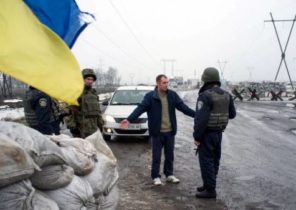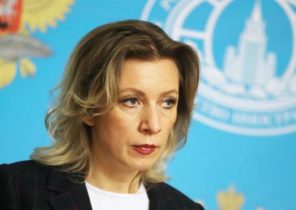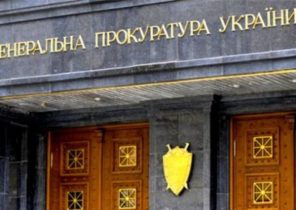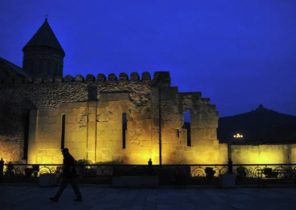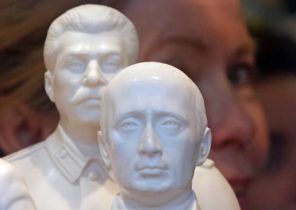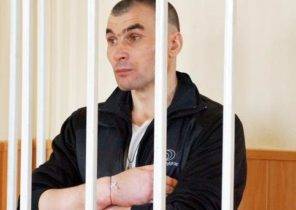There are cities with brutal symbolic cruelty: stone masterpieces, urban tradition, and strong gusts of wind, people of the sacred furniture of history, allegorical shadows of the snow and fog. Petersburg — one of those places, can live here only stable men who are called to the equality of souls and the fate of the lonely of loyalty to the society. These places tend to be described and interpreted, their destiny is to become an inner experience, something that happens inside of us like a landscape of the soul. I walk near the area where Dostoevsky wrote “Crime and punishment”: all these streets and squares filled with the myth of sin, the redemption, errors, mortality of all things, of all the utopias of history.
Saint Petersburg was not merely a background to revolution, it is the revolution itself. Only here could develop and reach its climax these events are only here rusty shackles gripping Russia, could be alleviated only here could ignite the sparks of revolution. Only here the variety of events we could concentrate in one single day, in a year which has contained something that would not be enough and hundreds of years. The city of cauldron, where a thousand degrees seethed a new life.
About revolution not read in books and on the walls, on the stone. It is not necessary to turn the pages, just turn to another street. Near Admiralty accidentally come upon a stele with the image of the profile of a man ill-looking. This is Dzerzhinsky, the founder of the Bolshevik political police, and impeccably well-established conveyor mechanism of the extermination of people! So, this is a luxury house in the neoclassical style, decorated with columns, funami and friendly nymphs — the first headquarters of the “Extraordinary Commission”. Go inside. The Cabinet remained in place untouched: the Bureau covered with green cloth, two vintage telephone, inkwell, into which dipped the pen, sign terrible orders and horrific calls to shoot the rebels, destroy the hypocrites, instant death to counter-revolutionaries, no doubt, to locate, to strike, to kill.
In the next room flipping sentences where cluster charges, stamp and signature. I see before me shamelessly naked life, cut with a sickle ruthless power crazy social cannibalism: 1919, Gulina-Zobel, known as “Dasha”, participated in the rebel Committee in Kronstadt, was sentenced to death. Basil Bakiev, worker, sentenced for sabotage, the father asks pardon, and to refuse to execute the sentence.
Yes, of course, I’m in Europe. In the sense that I can have it all, even the slightest trifle, unimportant, useless. Monuments Putin’s time for shopping. But the people with whom I am acquainted for many years, seem strangely pale, faded, as they were not in the turbulent Yeltsin years, when I met them. However, their economic and social situation has improved markedly. But nobody seems to have kept his personality, his ideas. They say only what to buy, where to go to relax, talk about money, some kind of obsession. Or maybe I just overestimated them. Maybe it is the eternal Russian “vulgarity” — a complex of vulgarity, the kitsch, the routine of conformism in which they find satisfaction not only aesthetic but also moral. It is described by Chekhov, but it was apparent on the streets in ephemeral riches of the NEP, in times of stagnation in the post-Soviet oligarchs. In the times of Putin.
Even the country that we in the West are aggressive, persistent in his desire to restore the power inside seems to me to be more vulnerable. Not in the political future, which seems to be predefined in the years ahead. But tell me about the economy living solely by oil and weapons, of course, the modern, which is more sold than used. Investment in industry and agriculture is insignificant, everything is imported and just going for the domestic market. Nationalist pride against the impudent and hostile America, to compensate for the collapse in purchasing power due to devaluation of the ruble, but how much it enough? This is the place where, paradoxically, I’ve heard less talk about trump: let’s see what he will do, an American, after all. Victory in Syria is not causing any excitement, much more disturbances and tremor occurs in connection with the Ukrainian “provocations”.
The Museum, which I’m looking for is just opposite of blue mosque. It was built in the late 19th century, the architect wanted to repeat the miracle of Samarkand. Today she seems closed and empty, but on Fridays, the day of the big prayer, its flood flows of people, former Soviet citizens, adherents of the Muslim faith — Caucasians, Azerbaijanis, Kazakhs — in the city a lot of them. This is the Russian version of the European topical migration issues. It is regulated with draconian decrees.
The Museum is located in the magnificent former mansion of Kshesinskaya ballet stars, divas, which some say was the mistress of Nicholas II. There are plenty of beautiful photos that pass untouched duality of her thrilling beauty, black hair, petite, big eyes. Looking at her through time, we have the passionate tenderness and the confused fear, always constitutes the beginning of a passion. The Bolsheviks confiscated her house in 1917, turning it into the headquarters of the party. Was brought here barely descended from the train at the Finland station Lenin that he gave instructions for the seizure of power.
Here was formerly a Museum of the revolution: with careful detachment he turned into “the Museum of political history of Russia”. On fundamental changes in the design and exhibits, we begin to understand what he thinks this country is hanging heavily about his past. And about myself.
Some things are striking. In the first room three screens with a constant stream of broadcast rare recordings of 1917. One is devoted to Lenin in the Smolny raging in the corridors, where once fluttered the young ladies and the blue hussars. On the second Kolchak, General of the White guard who almost managed to conquer St. Petersburg, that would have changed the course of history. Further Kerensky, the Commissioner of the provisional government, the lawyer, enjoying his speeches and believed that this is what can enchant the world experiencing turmoil. He fled the country, disguised as a woman, in the most imminent October, in his red locomobile, throwing to the winds the historic chance of the Russian revolution. All three are allocated the same space is assigned the same value, nothing, not even in the comments, will not push visitors to choose from them good and bad.
In the Museum notice that Lenin is very small, but a lot of Stalin. He’s waiting for you on the stairs, you’re not escape — a giant portrait of Marshal in uniform, he like goes to you, slowly, evenly, hard, step master, the king of the world. He does not hurry, is the epitome of a clueless government, the government of the soldier and the bureaucrat. However, the portrait is completely pushed into the common prison bars. If you look carefully at how it is attached to the wall, you notice that behind bars, you are yourself, the visitor. And he, the tyrant, looking at Russia, which is locked in chains.
Countless placards dedicated to women, the new Soviet women with hard features, in jackets, buttoned-up, (red) scarves covering the hair, with strained faces, disciplined socialists, scientific workers. Motherhood has become for them the “public concern”. I thought, isn’t it better to trust the revolutions impulsive, sensual, rebellious, and impetuous Marianne.
Walk through the gardens in front of the Cathedral of St. Isaac: the snow, the pale rays of the sun hiding behind the clouds that carries the wind, silence so deep that with each step in the ears resounds the creaking of boots on snow. The same gloomy silence, and at a time when this city slowly, proudly died of frost and hunger in the 900 days of German siege. In the dungeons of the Hermitage people worked and existed until his death. In the winter appeared everywhere sleigh from Nevsky to Piskarevsky, to hospitals, from constant slight creak of the runners seemed louder and louder from the explosions. He was out cold. The sleds needed to deliver the sick, the dying, the dead. The bodies were stiff, they made a light metallic sound when they were thrown into a large heap, because there was no effort to bury them. I saw a plaque on the wall stating that one day died on 10 thousand people! The town was dying as he had lived a few months before that, gritting his teeth.
Would be all possible, if not a revolution, not fire, not stormy days, which claimed a human life? It would be possible, if these shadows do not stood a formidable supporter of the revolution Stalin? His name is on the lips of the Red army attacked and turned into the ashes of Hitler’s demons.
